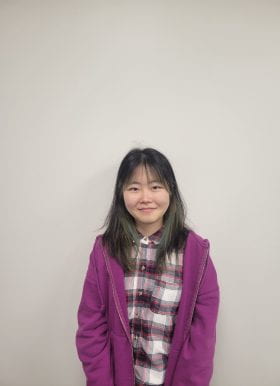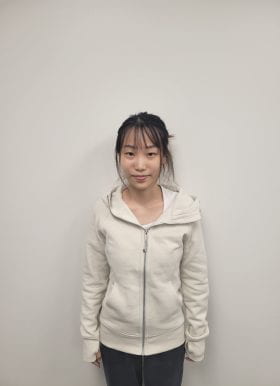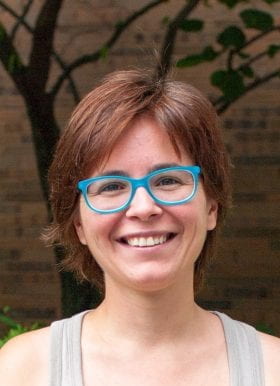
Laura Ibáñez, PhD
Assistant Professor, Psychiatry and Neurology | Leader, DIAN/DIAN-TU Fluid Biomarker Core
- Email: ibanezl@nospam.wustl.edu
My research aims to answer the following question: How can I generate a good biomarker? Aside from high sensitivity and specificity, a good biomarker must be cost-effective so it can be accessible at a population level and be easily repeatable; sensitive to acute or pre-clinical phases of the disease to allow greater therapeutic windows and improve patient management; minimally or non-invasive to minimize patient discomfort and agnostic to ethnic backgrounds. Additionally, a good biomarker should be able to monitor disease progression and response to potential disease-modifying therapies. My research, based on measuring RNA species in plasma, is designed to address all these issues. RNA is highly dynamic, which is potentially useful for monitoring disease progression and the response to treatment. RNA can be measured by real-time PCR, a cost-effective technique routinely used in clinical laboratories. Plasma is minimally invasive, easily accessible, widely used, and stored in most biobanks. Thus, my research focuses on plasma RNA species quantification and the application of advanced bioinformatics techniques to develop novel biomarkers and to identify novel mechanisms involved in neurodegeneration and acute ischemic stroke.

Aleksandra “Sashka” Berić, PhD
Postdoctoral Research Associate
- Email: aberic@nospam.wustl.edu
Aleksandra joined the Ibáñez lab in June 2022 following the completion of her Ph.D. degree at the University of Missouri-Columbia with Dr. Blake Meyers. During her doctoral studies, she gained expertise in sRNA and computational biology, which she is now leveraging to identify sRNAs that are involved in the pathobiology of neurodegenerative diseases, or that have the potential to be used as biomarkers for early detection of Alzheimer’s and Parkinson’s diseases. In her free time, she likes to bake, travel, and enjoy time with her family.
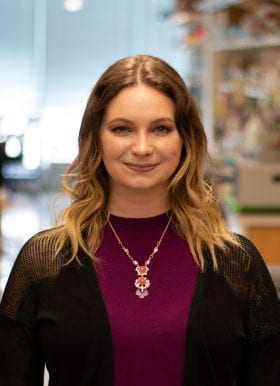
Charissa Martin, MS
Bioinformatics Research Analyst
- Email: charissa@nospam.wustl.edu
Charissa is a Midwest-native passionate about science, art, and community. At Webster University, she double majored in biology and audio production and minored in art. She went on to receive her M.S. in Bioinformatics & Computational Biology from Saint Louis University in the Fall of 2019. She previously worked at WUSM as a bioinformatics intern within the labs of Meagan Baldridge and Scott Handley. She later joined Eli Roberson’s staff as a bioinformatics analyst where she helped to create a pipeline for processing RNA sequencing data. Charissa joined Ibáñez lab in March 2023 and is assisting with ongoing RNA sequencing projects. Outside of the lab, Charissa stays busy juggling her own hobbies with those of her husband and two kids. She especially enjoys performing as a member of the St. Louis Community Chorus.

Ravindra Kumar, PhD
Staff Scientist
- Email: kravindra@nospam.wustl.edu
Ravindra Kumar received his PhD in Bioinformatics from the University of Delhi, India. His doctoral studies focused on developing machine learning models and software for protein annotation and subcellular localization prediction. During his past training, he gained extensive experience working with a variety of biological data, including proteomics, genomics, and epigenomics data. He developed several bioinformatics algorithms for protein annotation and classification, constructed high-density sequence and linkage-based recombination maps in melon, created ShinyApp to measure transcriptional responses to anti-cancer agents across NCI-60 cancer cell lines and designed visualization tools for multi-omics data to study the effects of environmental exposure in mice during embryonic and early postnatal development stages. In June 2024, he joined Dr. Laura’s lab as a senior scientist, where he focused on orthogonal validation and analysis of high-priority biomarkers in Parkinson’s disease.
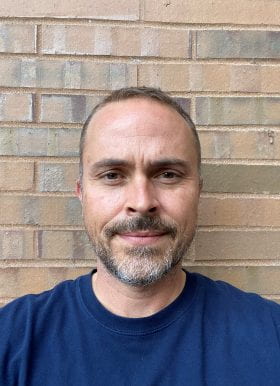
Matthew Minton, BS
- Email: mminton@nospam.wustl.edu
Matt joined the DIAN Fluid Biomarker Core near the end of 2022. He graduated from the University of Missouri St. Louis in 1999 with a BS in Biology. He’s worked for various labs at Washington University School of Medicine ever since including Dr. Pui Kwok, Dr. Howard Mcleod, Dr. Sharon Cresci and Richard Head. Within those lab’s he mainly performed Sanger and Pyrosequencing for SNP genotyping and discovery. Genotyping was usually carried out for SNPs with known disease associations and drug interactions. Most of this work contributed the NCBI’s dbSNP project. He spent 10 years at the Genome Technology Access Center (GTAC@MGI) in both research and clinical settings. Mainly focused on RNA-seq and Exome Capture library preparation for NGS sequencing. The last few years there were spent on systems improvements involving automated liquid handling systems.
Outside of lab life Matt enjoys spending time with his family and working on home improvements. He also enjoys skateboarding with friends.
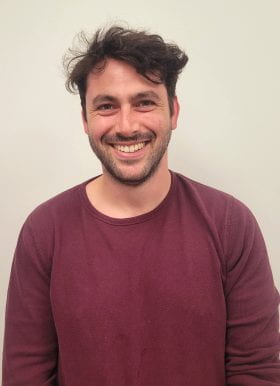
Sam Preminger, BS
Clinical Research Specialist
- Email: psam@nospam.wustl.edu
Sam Preminger started with the team as a clinical research specialist in 2022 and serves as the project manager for all things related to the Biomarker Core within the DIAN Trial Unit. He received his BS in Neurobiology, Physiology and Behavior from UC Davis and has been working within the clinical research industry for seven years. Over the years, he has provided clinical research support to trials covering dermatology, traumatic brain injury, stroke and now Dominantly Inherited Alzheimer’s Disease.
He works remotely from Dallas, Texas, but has the opportunity to meet the fantastic members of the team in person while traveling to meetings. For fun, Preminger loves delving into one of his many varied hobbies including cooking, playing music, reading fantasy books and playing chess and video games.
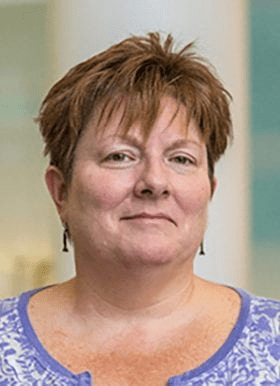
Gina Jerome, MS
Staff Scientist
- Email: ginajerome@nospam.wustl.edu
Gina Jerome received her B.S from Eastern Illinois University where she majored in botany and her M.S from Louisiana State University with an emphasis on plant physiology. She started her career in pharmaceutical research and developed a keen interest in this field, never looking back. She spent 20 years at a pharmaceutical company in small molecule drug discovery research where she focused on identifying small molecules to modify inflammation, primarily osteoarthritis. While there she co-authored many research publications. Her most fulfilling project involved research for an inhibitor of nitric oxide synthase, a proposed mechanism of action in the numerous, inflammatory pathways of osteoarthritis.
Her role as staff scientist currently centers on the Biomarker Core Lab for the Dominantly Inherited Alzheimer Network Observational Study (DIAN-OBS) and external collaborations. This includes laboratory and biorepository functions and assorted duties that keep the lab running. The analysis of DIAN OBS samples is an important aspect of her job which includes planning/execution of various analyte determinations and development/validation experiments. She manages sample collection, CSF and plasma, intake from over 20 sites worldwide for DIAN-OBS.
Outside of the office she enjoys Netflix binges, gardening, reading, all music and has recently joined Shutter Bee, a research project enlisting “citizen scientists” with backyard bee photography to improve conservation practices. Her time in Louisiana sparked an interest in cooking all thing’s Creole and Cajun and an appreciation of the culture in southern Louisiana -Laissez les bons temps rouler!
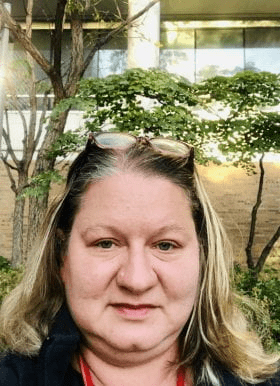
Jennifer Stauber, MS
Research Specialist
Jennifer Stauber joined the DIAN-TU Biomarker Core in 2020, in the middle of a pandemic. Stauber received an MS in Cell & Molecular Biology from the University of Missouri‐St. Louis. She has been working at the Washington University School of Medicine since 2011, most recently for the McDonald Genome Institute. Prior, she led investigations into biomarkers of disease severity in C. dificile infection and Environmental Enteropathy. She loves being a part of the collaborative WUSM research community and finds great satisfaction in impactful human subjects’ research.
Outside of science, Stauber enjoys gardening, reading, hiking and salsa dancing. Besides three boys, she and her husband are currently raising a flock of runner ducks.
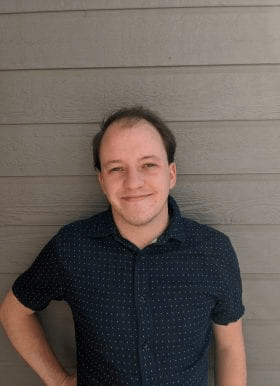
Bryce Baker, BS
Research Technician II
- Email: bbaker26@nospam.wustl.edu
Bryce Baker joined the Fluid Biomarker Core in April of 2021 as a research technician. He graduated in 2019 with a bachelor’s degree in biology, with an emphasis in ecology and conservation. Previously, he worked as a tech in a COVID-19 lab. His passion for research and lab work led him to pursue a position at the Fluid Biomarker Core.
In his free time, Baker enjoys travel, hiking, baking, visiting the national parks and the occasional home improvement project.

